

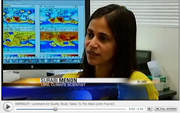
Berkeley Lab’s Surabi Menon (pictured) and Thomas Kirschstetter were featured on KTVU News last Thursday in a report on carbonaceous aerosols, particles that are now abundant in the atmosphere as a result of the incomplete combustion of fossil fuels. Menon and Kirschstetter, both with the Environmental Energy Technologies Division, have conducted studies on the effects of black carbon, or soot, which can have either a warming or a cooling effect, depending on whether the particles absorb sunlight or reflect it back into space. More>
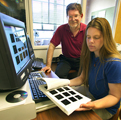 Outreach: Students, Teachers Descend Upon Lab for Summer Internships
Outreach: Students, Teachers Descend Upon Lab for Summer Internships Beginning today, 145 students, faculty members and teachers from around the country will bike, drive and bus their way up the hill to make Berkeley Lab their home for the summer. They include 109 undergraduates and eight faculty members from 64 colleges nationwide, 23 students from local high schools, as well as 28 teachers and teachers in training. Hosted by The Center for Science and Engineering Education, along with 97 mentors, participants will be working across a variety of research disciplines. Today's group will include approximately 90 interns who will eat their lunch in the cafeteria after morning orientation. More>
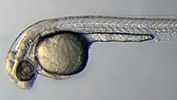 [ABC News] Scientists are a step closer to unraveling one of the greatest mysteries of the biological world: how stem cells morph into different organs and tissues to create a living creature. Thanks to a remarkable little fish, and some very clever engineering at Berkeley Lab, they now can watch in real time as an undistinguishable blob of cells gradually change into an embryonic zebra fish, one cell at a time. Until now, scientists could only observe this process by harvesting a living animal and examining each step as it moves through the embryonic stage. More>
[ABC News] Scientists are a step closer to unraveling one of the greatest mysteries of the biological world: how stem cells morph into different organs and tissues to create a living creature. Thanks to a remarkable little fish, and some very clever engineering at Berkeley Lab, they now can watch in real time as an undistinguishable blob of cells gradually change into an embryonic zebra fish, one cell at a time. Until now, scientists could only observe this process by harvesting a living animal and examining each step as it moves through the embryonic stage. More>
The Badge Office will be closed today in order to process summer interns, teachers, and faculty. As such, there will be no badge or parking permit processing, generation of LDAP passwords, GERT Training, or other services the office normally provides. The office will also be closed on Monday, June 14 from 8 a.m. to 2 p.m. for the same reason. Contact Sam Houston (x4855) for more information.
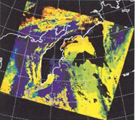 World of Science: U.S. Climate Satellite Capabilities in Jeopardy
World of Science: U.S. Climate Satellite Capabilities in Jeopardy [Wired] The United States is in danger of losing its ability to monitor key climate variables from satellites, according to a new Government Accountability Office report. The country’s Earth-observing satellite program has been underfunded for a decade, and the impact of the lack of funds is finally hitting home. Climate observation missions have very particular requirements, said Berkeley Lab climate scientist Inez Fung. “If you want to do climate change, you need a uniform set of data so that you can compare changes through time,” Fung said. “It’s a really tough problem.” More>
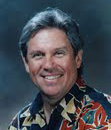 People: Former Berkeley Lab Scientist Wins Kavli Prize
People: Former Berkeley Lab Scientist Wins Kavli Prize Last Thursday, in Oslo, the Norwegian Academy of Sciences and Letters announced the 2010 Kavli Prizes awarded to eight scientists in three categories. A third of the astrophysics prize went to Jerry Nelson, who as a research fellow in Berkeley Lab’s Physics Division in the 1970s and 80s invented the concept of huge telescopes made of segmented mirrors that could actively respond to changing sky conditions. As Project Scientist of the resulting Keck Telescopes, Nelson joined UC Santa Cruz in 1994. He shares the prize with telescope designers Roger Angel and Raymond Wilson. More>
Today
at Berkeley Lab encourages feedback and story ideas
Deadline for submissions is 10 a.m. two days prior to publication
TABL is produced by Public Affairs' Communications Group